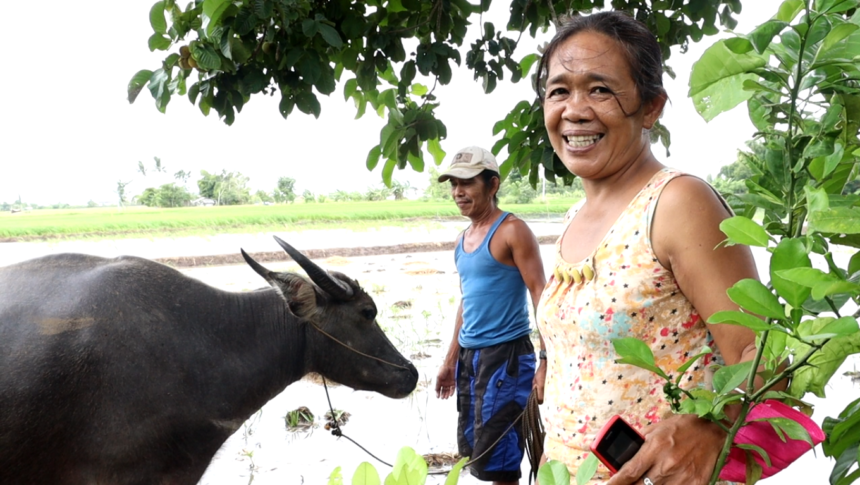Bicol, Philippines – Maritess is a svelte, stout woman in her golden years. For years, she is the leader of “Samahan ng mga Kababaihang Magsasaka ng Concepcion Grande” in Naga, Camarines Sur. She never lost her assertiveness even in interviews. Maritess is a poor farmer from Naga, Camarines Sur in the Bicol Region, a region known not only for the Mayon Volcano but also for its large flatland rich with natural resources that is suited for agriculture. Hearing her narrative, Maritess represents the life of a farmer. For several years, she witnessed how difficult the life of a farmer was.
Every June, Maritess and her family gear up for the onset of the rainy season, the period where strong typhoons are frequent and a phase when they are always in despair. Majority of them traditionally rely on agriculture to survive and is therefore vulnerable to the country’s erratic weather patterns such as typhoons and droughts. Hence, small-scale farmers like Maritess suffer from production loss, plowing them to the brink of poverty.
One of the perceived culprits why farmers remain struggling is the lack of support they receive from the government. Numerous agricultural programs have been launched. However, not all and apparently only a few have benefitted from it. Moreover, many farmers are still cultivating land they do not own. Therefore, their income remained meager.
Lack of Farming Equipment
According to Maritess, in the 400 hectares of rice field that they till, only two or three farmers have agricultural sprayers while most of the farmers have to look for a hand tractor in another town to cultivate their land, which, according to them, is an expensive waiting game. When renting a hand tractor, they usually pay 250 pesos per hour, depending on the size of land to be cultivated.
According to Philippine Center for Postharvest Development and Mechanization (PhilMech), Filipino farmers are one of the least mechanized in Southeast Asia with only .57 horsepower per hectare. This is mainly because most of the Filipino farmers lack the purchasing power to meet their farming needs.
“We can’t afford to buy equipment like that because our income is not even enough for us”, Maritess said.
Drowning in Debt
Aside from keeping up with the inconsistent weather patterns, farmers also face an unending cycle of debt. Typhoon Rolly, the strongest typhoon that hit the country in 2020, greatly affected the Bicol Region leaving a billion peso worth of losses to the agricultural sector, affecting thousands of small-scale farmers, including Maritess. To recover from this blow, Maritess was again forced to borrow money from usurers. There are times that the interest on their debt was even greater than the amount of money they owed. This is due falling prices in palay, as the Rice Liberalization Law came into force. And when the harvest season arrives, they only have enough to pay off their debts and there is nothing left for them.
Despite the odds, hope grows greener
Fortunately, through an initiative funded by GlobalGiving, farmers in Naga Camarines Sur and Daraga, Albay were given hope in the form of farming inputs. On February 27, CDRC along with its implementing partner Tarabang para
sa Bicol Inc., turned over farming inputs to two (2) beneficiary organizations in Bicol. Under the Early Recovery Assistance for Communities Severely Affected by Super Typhoon Rolly in Bicol, each of the beneficiary organizations located in Brgy. Maopi and Concepcion Grande received a hand-tractor, a carabao, sets of farming tools, and a tricycle. An estimated 300 marginalized farmers in Albay no longer have to pay expensive rental fees for hand tractors and logistics every time they plant and harvest rice.
The early recovery project aimed to boost farmers’ household income through the provision of new farming equipment. These helped to speed up their farm activities and lessen their expenses of renting farm equipment such as hand tractors, thereby increasing their agricultural productivity and income.
Arnold Velasco, leader of Maopi Farmers Association from Brgy. Maopi, Albay said that the provided hand tractors was god-sent to them.
“Before, I used to rent a hand tractor. Guess how much it costs? Others rent it for 200 to 250 pesos per hour. Can you believe that? That’s why I’m very thankful that Global Giving gave us this hand tractor here in our barangay. Work in our rice field has become easier.”
The tricycle was of great help in reducing the farmers’ expenses in transporting their agricultural inputs as well as for the marketing of their produce as the transportation fare has gone up since the pandemic began. Meanwhile, the farm tools were also a big help as only few of them have basic farming tools like rake and hoe.
The early recovery project also provided two mother carabaos to help boost the living conditions of the farmers in Bicol. The two beneficiary organizations agreed that the carabao would be taken care of by a member of the organization. It was also agreed that when the carabao gives birth, the offspring will be distributed to other members until all the members of the organization will own a carabao.
“On behalf of the Brgy. Council, we thank you for your help. Rest assured that we will take good care of your donations so that the farmers will be able to use them for a long time,” said Grace Nabya of Brgy. Concepcion, Grande in Camarines Sur.
Behind these farmers’ masks were tired and weary faces. But the gleam in their eyes remain optimistic. Their struggles may not end right away. But as long as there are people who are willing to help and their organization remain strong, recovery is not impossible.

